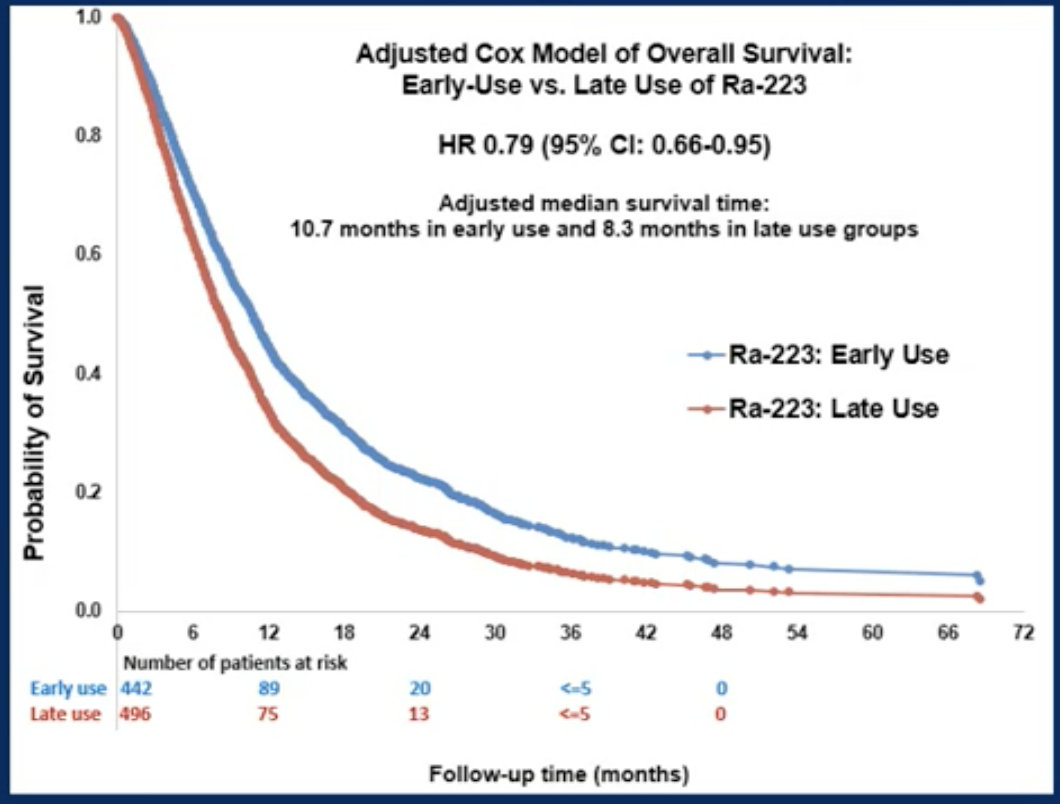(UroToday.com) Data from the landmark ALSYMPCA trial1 found that the targeted alpha therapy Radium-223 prolonged overall survival in men with metastatic castration-resistant prostate cancer (mCRPC).1 However, there is little data to guide clinicians as to the appropriate sequence for use of Radium-223 in men with mCRPC with regards to other life-prolonging therapies. At the 2021 ASCO Genitourinary Cancers Symposium (ASCO GU), Dr. Lawrence Mbuagbaw and colleagues presented results of their real-world study evaluating clinical outcomes of patients when Radium-223 was used early (second-line) or late (third or later lines) among men with mCRPC.
For this study, the authors used administrative databases in Ontario (Institute for Clinical Evaluative Sciences, 2012-2017) to estimate overall survival from the start of second-line life prolonging therapy, and event free survival (time from start of second-line life prolonging therapy to start of fourth-line or death) using counting process models, comparing two cohorts of patients: early Radium-223 (2nd line) versus late Radium-223 (3rd or later line). Life prolonging therapies included Radium-223, docetaxel, cabazitaxel (post-docetaxel), abiraterone, and enzalutamide. The study design is as follows:
All models were adjusted for relevant fixed and time-varying covariates, including age, PSA, hemoglobin, Charlson Comorbidity Index, use of bone health agents, prior systemic treatments, Gleason score, TNM score, ADT and standardized pain score.
Data from 598 men in Ontario with mCRPC who received at least two lines of life-prolonging therapy, including Radium-223 in second-line or later were analyzed (early Radium-223 n=253, 42.3%; late Radium-223 n=345; 57.7%). The mean age at the start of first-line life-prolonging therapy was 72.2 years (SD8.8). Patients in the early Radium-223 cohort had a longer time from diagnosis of prostate cancer to receiving first-line life-prolonging therapy, a longer time from start of first-line to start of second-line life-prolonging therapy, and were less likely to receive docetaxel. The median number of Radium-223 cycles was 5 (range 3-6) and 4 (range 3-6) and the mean number lines of total life-prolonging therapy was 2.7 ± 0.9 (2.0 - 7.0) and 3.8 ± 0.9 (3.0 - 7.0) in the early and late Radium-223 cohorts, respectively. The number of lines of life-prolonging therapy received, percentage of patients receiving each life-prolonging therapy at any time, and first-line treatment utilization (stratified by early versus late Radium-223 use) is as follows:
Overall survival was better in the early Radium-223 cohort compared to the late Radium-223 cohort (HR 0.79 95% CI 0.66-0.95):
Event free survival was better in the early Radium-223 cohort compared to the late Radium-223 cohort (HR 0.71, 95% CI 0.58-0.86):
Additionally, time to first hospitalization (HR 0.61, 95% CI 0.48-0.76) and time to first emergency department visit (HR 0.78, 95% CI 0.61-1.0) was longer in the early Radium-223 cohort.
Dr. Mbuagbaw concluded his presentation discussing real-world outcomes of utilization of Radium-223 in Ontario, Canada with the following take home messages:
- Patients who received Radium-223 in second-line versus third-line or later had better outcomes
- Additionally, patients who received Radium-223 early received less chemotherapy, but had better survival
- The selection of patients who may benefit the most from Radium-223, and the optimal timing of the Radium-223 in the sequence of treatments, are being evaluated in a larger Canadian study including data from four Canadian provinces (REACTIVATE NCT04281147).
Presented by: Lawrence Mbuagbaw, MD, MPH, Ph.D., McMaster University, Hamilton, ON, Canada
Co-Authors: Jennifer Lowther, Richard M. Lee-Ying; McMaster University, Hamilton, ON, Canada; Bayer, Inc., Mississauga, ON, Canada; Tom Baker Cancer Center, University of Calgary, Calgary, AB, Canada
Written by: Zachary Klaassen, MD, MSc – Urologic Oncologist, Assistant Professor of Urology, Georgia Cancer Center, Augusta University/Medical College of Georgia, Twitter: @zklaassen_md during the 2021 ASCO Genitourinary Cancers Symposium (ASCO GU), February 11th to 13th, 2021


